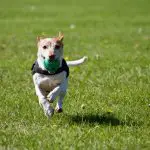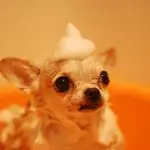How to eliminate your puppys love of nipping!
If you’ve ever been nipped by a puppy, you know those teeth can be as sharp as needles. While other dogs generally have thick skin and can handle a nip relatively undamaged, we humans are not quite so fortunate. And yes, a puppy bite can definitely break skin, I know that from personal experience.
So how do you put a stop to your puppy’s nipping?
First, it helps to understand that it’s not biting maliciously. Biting and mouthing are natural activities for puppies and young dogs. They instinctively nip when playing with their siblings. This is the way they interact with the world around them.
Left with his family, a puppy would soon be taught by his mother and siblings to control his bite. But most puppies are removed from their mothers before they’ve had a chance to learn this lesson.
With this in mind, taking advantage of your puppy’s natural instincts can actually provide you with an easy, painless way to inhibit it’s biting.
All you have to do is let them play and socialize with other dogs.
Puppies love to tumble and roll and play. They also love to nip. If your puppy becomes a bit too rough in the company of other dogs, the rest of the group will quickly correct it’s inappropriate behaviour As simple as it is, this socialization with other dogs is easily the most effective way for a dog to learn to control it self when it’s tempted to nip.
There are other benefits to socializing your puppy as well. It’ll learn not to fear other dogs. It’ll expend it’s excess energy. And you’ll find that it interacts better with the rest of your family.
Puppies that miss out on socializing with other dogs tend to be hyperactive and destructive and exhibit other problem behaviours In addition, un-socialized dogs will often react aggressively to new situations. So any efforts you make to expose your puppy to other dogs and new people (especially children) will pay dividends in many areas of your puppy’s development.
This can be particularly helpful if you have children in the family.
Children are closer in size to dogs, and they often have that same puppy-like energy that can be interpreted as aggressive by a dog. So while your puppy is still young (four months old or even younger), this is a good time to have it interacting with children in a proper manner that excites neither your puppy or the children. This can be especially important if your puppy is from a breed of large or aggressive dogs.
The next way to work with your puppy in eliminating biting behaviours is to gain it’s trust and respect. This goes a long way toward making all training easier and more effective, especially if you’re working to correct problem behaviours.
How do you gain your puppy’s respect? By treating it with respect. Whether you’re training your puppy or just playing, always treat it with respect. This means no hitting or slapping your puppy, even in situations where you’re trying to correct inappropriate behaviour Physical punishment will not only destroy the trust and respect of your puppy, it’ll make it afraid of you. More important, it’s often ineffective. Reprimanding your puppy will not stop it from biting. It’ll only confuse it.
Using positive reinforcement, which generally means treats and plenty of praise, will teach it much faster and more effectively to play without biting.
A puppy that bites will grow up to be a dog that bites unless you teach it better. Left alone, these negative behaviours only become worse. So deal with them early, and deal with them positively, and you’ll establish the foundation for a loving, healthy relationship with your puppy for the rest of it’s life.
Also it is a good idea to begin to train your puppy as soon as it possible because a well trained dog that is well exercised will have no need to nibble or bite.


